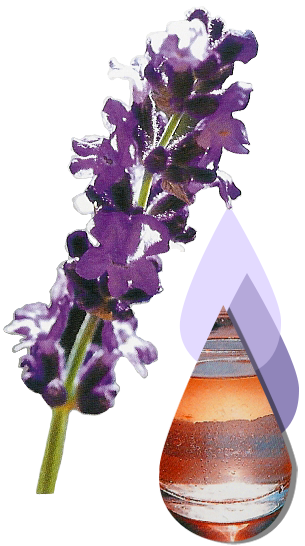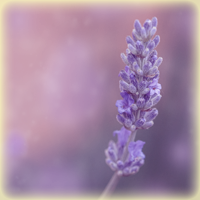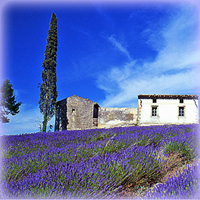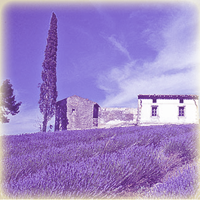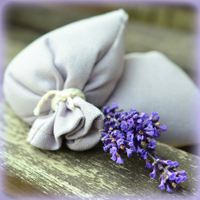Anecdotes
A story of bees and lavender
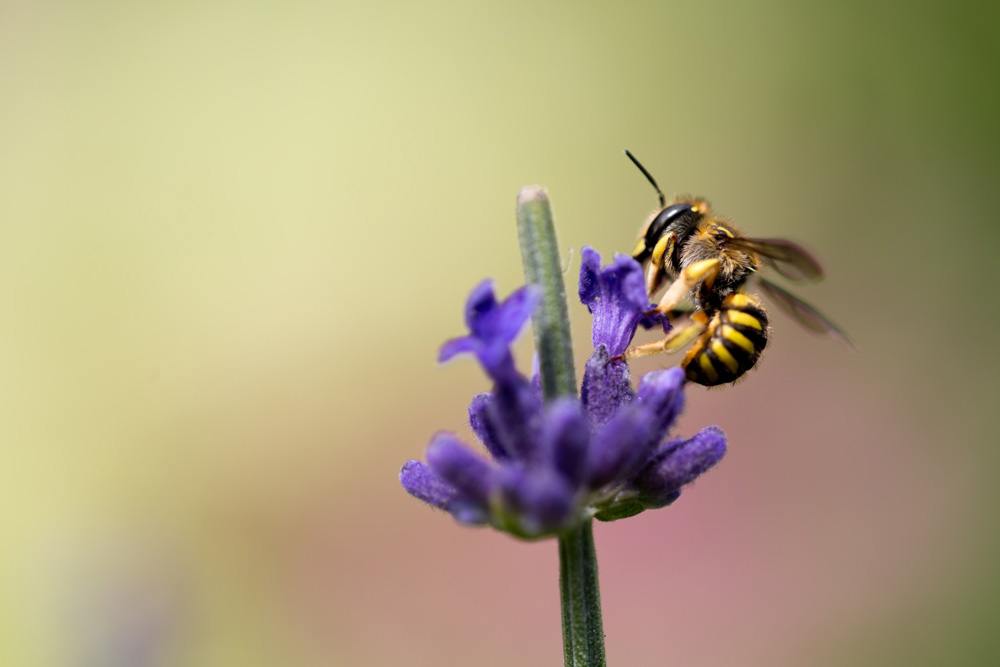
In the St. Jalle valley near Nyons, there are those who grow lavandin and who raise bees. There are others who grow only lavandin and still others who keep bees but do not grow lavandin...
All get along well together generally, the bees, the lavandin and those who take care of them.
However, sometimes dissent arises between those who grow lavandin but have no bees and those having bees but no lavandin. Although it is not too serious at the start the dissent can, only occasionally, fester like a bee sting on which one forgot to rub a little lavender (or...lavandin) essential oil..
This is a story about one such disagreement:
Ephraim grew his lavandins in the Sainte-Jalle valley, a pretty valley whose beautiful lavandins were a pleasure to view...
He lovingly cultivated them and took pleasure in just contemplating them as he worked his fields and, sitting on his tractor, he admired the neat alignment of the rows in full bloom. And yet, the bees from his neighbor, Séraphin, were sometimes a bit annoying. No, not really nasty to be honest but “buzzy” and stubborn, always coming to gather pollen from his lavandin – which on the contrary, is not critical – but they swarmed around the Ephraim’s head bothering him somewhat. After all, bees are really useful and attractive and moreover, it is a wonder to see them, especially thinking of their honey - so delicious with walnuts; after all, it is the bees that make it. So Ephraim didn’t complain, neither to the bees nor Séraphin. But things got really worse one fine morning when Ephraim was calmly hoeing his tufts of lavandin when a squadron, no, an entire army, of big, black, aggressive bees swarmed in. Instead of flying gently around him to take the latest news, they started to attack and drove him out of his very own field.
Poor Ephraim could only take a few swipes with his cap and made a hasty retreat. He went to ask Séraphin the reason for the attitude of his new renters and was told that it was a new breed of very aggressive but very productive bees and it was out of the question to get rid of them. Séraphin added that they came from Russia. “Decidedly” thought Ephraim, “One has to watch out for things coming from foreign lands.” As he was by nature a conciliatory sort, he did not get angry and returned to his lavandin fields. Or rather, he wanted to return; the “Russian” bees were there first and intended to stay. Ephraim could not enter his own field. For days, he tried, but each time he was there just for a few minutes, his intolerant neighbors began to get nervous and he had to retreat quickly. He returned to see Séraphin who was not about to listen and even pointed out that the bees were within their rights; he personally could not care less.
Ephraim thought it over and an idea popped up: with beekeeper’s mask, gloves and boots, he went to his field and amply sprayed the border hedges and a few rows of lavandin with a strong solution of methylene blue.
He waited.
He still wasn’t able to work his lavandin field but the weeds had a field day. Others had a field day too: Seraphim’s Russian bees worked from morning to evening with an energy equal to their aggressivity. Séraphin was somewhat surprised to see Ephraim smiling as he watched all that but, oh well, there were other things to do and honey to collect.
Speaking of the honey collected, it was superb, even magnificent, and better than ever. Unfortunately, the honey Seraphim collected in abundance this year had an extraordinary bluish color which, while not affecting quality, made it totally unfit for sale; customers were not used to spread blue honey on their bread. Ephraim had a good laugh over this.
Seraphim discreetly found out what happened from his druggist in Nyons; he understood completely and didn’t say a word. He angrily fired his “Russian bees” and employed only local bees from then on. Still somewhat mischievous but gentle, they made a nice partnership with the lavandin and those who cultivate it.
He lovingly cultivated them and took pleasure in just contemplating them as he worked his fields and, sitting on his tractor, he admired the neat alignment of the rows in full bloom. And yet, the bees from his neighbor, Séraphin, were sometimes a bit annoying. No, not really nasty to be honest but “buzzy” and stubborn, always coming to gather pollen from his lavandin – which on the contrary, is not critical – but they swarmed around the Ephraim’s head bothering him somewhat. After all, bees are really useful and attractive and moreover, it is a wonder to see them, especially thinking of their honey - so delicious with walnuts; after all, it is the bees that make it. So Ephraim didn’t complain, neither to the bees nor Séraphin. But things got really worse one fine morning when Ephraim was calmly hoeing his tufts of lavandin when a squadron, no, an entire army, of big, black, aggressive bees swarmed in. Instead of flying gently around him to take the latest news, they started to attack and drove him out of his very own field.
Poor Ephraim could only take a few swipes with his cap and made a hasty retreat. He went to ask Séraphin the reason for the attitude of his new renters and was told that it was a new breed of very aggressive but very productive bees and it was out of the question to get rid of them. Séraphin added that they came from Russia. “Decidedly” thought Ephraim, “One has to watch out for things coming from foreign lands.” As he was by nature a conciliatory sort, he did not get angry and returned to his lavandin fields. Or rather, he wanted to return; the “Russian” bees were there first and intended to stay. Ephraim could not enter his own field. For days, he tried, but each time he was there just for a few minutes, his intolerant neighbors began to get nervous and he had to retreat quickly. He returned to see Séraphin who was not about to listen and even pointed out that the bees were within their rights; he personally could not care less.
Ephraim thought it over and an idea popped up: with beekeeper’s mask, gloves and boots, he went to his field and amply sprayed the border hedges and a few rows of lavandin with a strong solution of methylene blue.
He waited.
He still wasn’t able to work his lavandin field but the weeds had a field day. Others had a field day too: Seraphim’s Russian bees worked from morning to evening with an energy equal to their aggressivity. Séraphin was somewhat surprised to see Ephraim smiling as he watched all that but, oh well, there were other things to do and honey to collect.
Speaking of the honey collected, it was superb, even magnificent, and better than ever. Unfortunately, the honey Seraphim collected in abundance this year had an extraordinary bluish color which, while not affecting quality, made it totally unfit for sale; customers were not used to spread blue honey on their bread. Ephraim had a good laugh over this.
Seraphim discreetly found out what happened from his druggist in Nyons; he understood completely and didn’t say a word. He angrily fired his “Russian bees” and employed only local bees from then on. Still somewhat mischievous but gentle, they made a nice partnership with the lavandin and those who cultivate it.
